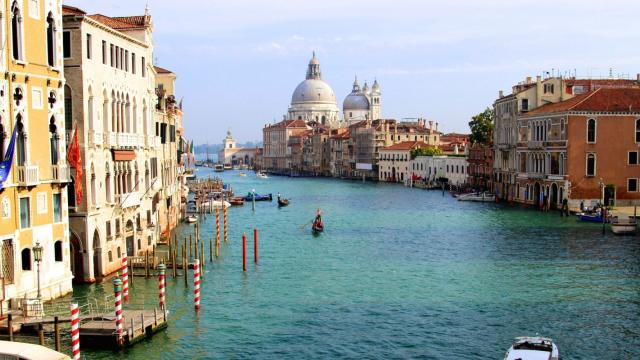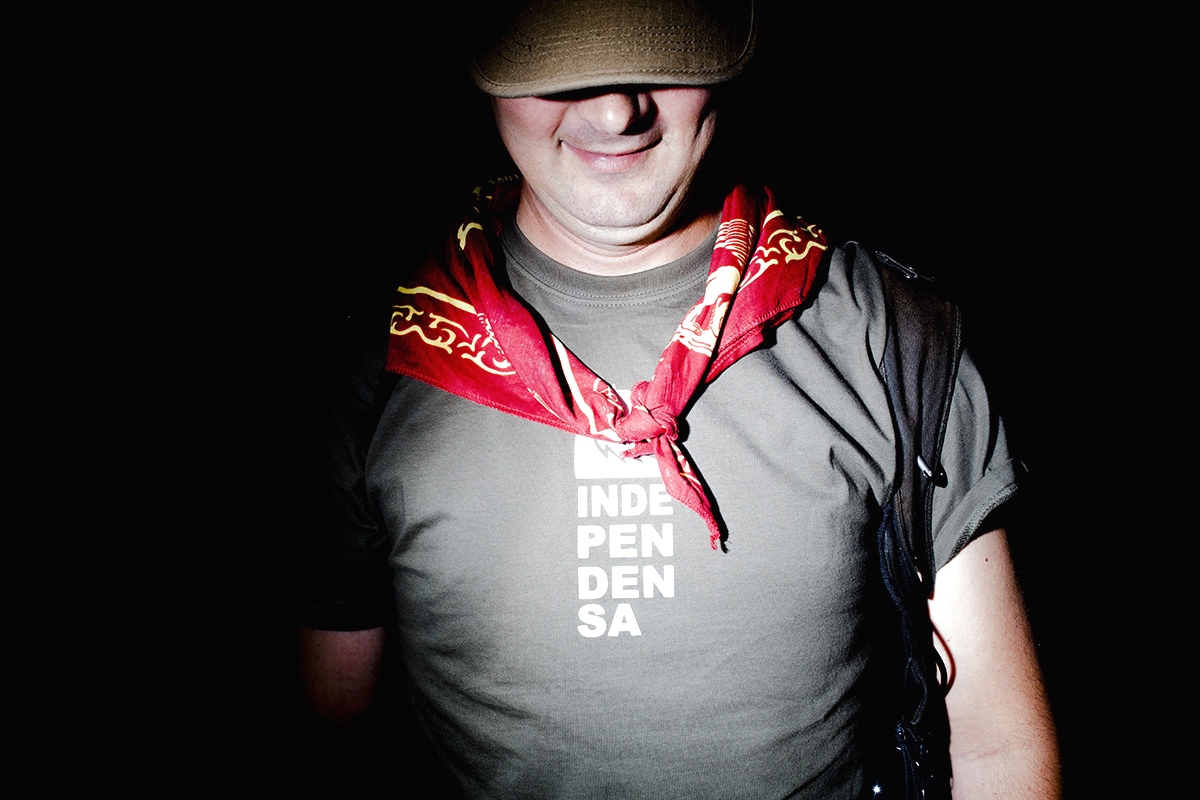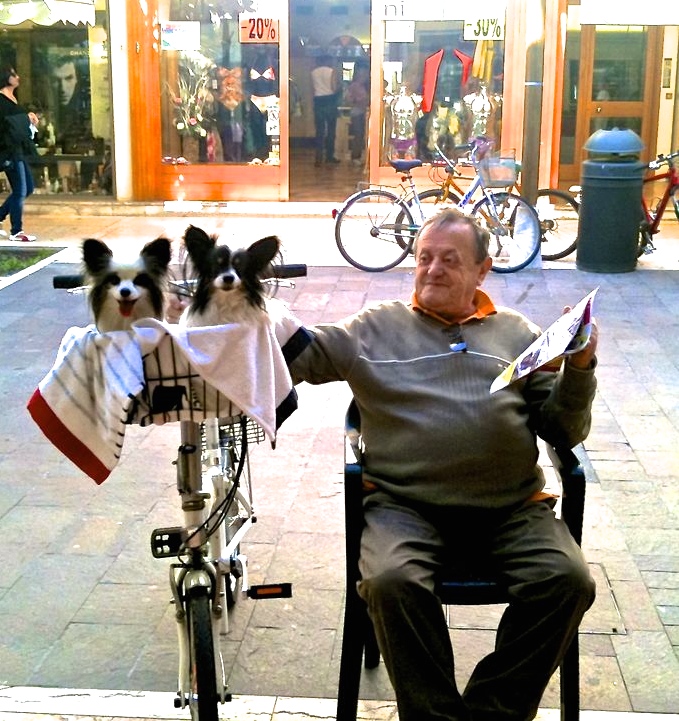
"Ballot" is not originally an English word: It comes from the Venetian word ballotta, or "little ball." For centuries, councils elected the Doge of Venice, who ruled the city-state, with small silver and gold balls. Now Venetians have put their modern equivalent to good use in a bid to declare independence from Italy. And they have a pretty good case to make for restoring their once-mighty republic.
Last week, in a move overshadowed by the international outcry over Russia's annexation of Crimea, Plebiscito.eu, an organization representing a coalition of Venetian nationalist groups, held an unofficial referendum on breaking with Rome. Voters were first asked the main question—"Do you want Veneto to become an independent and sovereign federal republic?"—followed by three sub-questions on membership in the European Union, NATO, and the eurozone.
The region's 3.7 million eligible voters used a unique digital ID number to cast ballots online, and organizers estimate that more than 2 million voters ultimately participated in the poll.
On Friday night, people waving red-and-gold flags emblazoned with the Lion of St. Mark filled the square of Treviso, a city in the Veneto region, as the referendum's organizers announced the results: 2,102,969 votes in favor of independence—a whopping 89 percent of all ballots cast—to 257,266 votes against. Venetians also said yes to joining NATO, the E.U., and the eurozone.
The overwhelming victory surprised even ardent supporters of the initiative, as most polls before the referendum estimated only about 65 percent of the region's voters supported independence.
Luca Zaia, Veneto's regional president and the referendum's most prominent supporter, echoed the sentiments of separatist movements across Europe when he declared that international law allowed "the right to self-determination." But whether Italian law allows it is a different matter. "The 'digital plebiscite' has no legal value and it cannot force anyone to do anything," claimed Mario Bertolissi, an Italian constitutional scholar. "In short, it has no practical consequences."
But with Scotland voting on independence from the U.K. in September and Catalonia weighing an unauthorized November referendum to leave Spain, it's worth watching how Veneto's independence campaign plays out.
The Most Serene Republic of Venice, as it was officially known, dominated the Mediterranean Sea during its thousand-year lifespan between the seventh and eighteenth centuries. At its height, the state's traders and merchants sailed from the lagoons of the northern Adriatic Sea to the shores of Syria and Lebanon, carrying spices and silks from Asia to Western markets.
Venice itself, a cosmopolitan city whose culture and arts were rivaled only by those of Florence and Rome, produced explorers like Marco Polo, composers like Antonio Vivaldi, writers like Giacomo Casanova, and painters like Titian.
But a centuries-long economic decline, caused by the shift in trade routes from the Mediterranean to the Atlantic during Europe's early colonial period, culminated in France's almost-bloodless conquest of the republic in 1797. Paul Strathern described its capture by Napoleon's revolutionary army in his recent history of the city:
"When the city and the nearby islands had been secured, 4,000 soldiers of the revolutionary army staged a parade, accompanied by brass bands, in the Piazza San Marco. The watching citizens well understood the significance of the event: this was the first time in Venice's long history that foreign troops had set foot in the city.
"Further humiliations marking the end of the independent Republic soon followed. Bonaparte ordered that a 'Tree of Liberty' be planted in the Piazza San Marco, beneath which the doge's corno, and other insignia of office, were ceremonially burned, along with a copy of the Golden Book listing all the noble families. The deposed doge and the former members of the Grand Council who had not fled the city were then made to dance around the flames, while the watching citizens were encouraged by the French soldiers to jeer at their former masters.
"Next it was the turn of the city itself to be dismantled. The French army began taking down the bronze horses of San Marco and removing other treasures, in preparation for their trans-shipment to France. The city's destruction, both political and symbolic, was now complete. The 1,000-year-old Republic of Venice was no more."
Both the city-state and its inland territory fell under French and then Austrian rule for the next half-century. A short-lived Republic of San Marco declared independence in the region during the revolutions of 1848, but surrendered to Austria just over a year later. After Austria's defeat during the wars of Italian unification, an 1866 plebiscite in Venice, held in the shadow of an Italian military garrison, registered 647,246 votes in favor of annexation by the Kingdom of Italy and only 69 votes against—a margin worthy of Putin's Russia.
Separatist movements in Venice and its surrounding region, called Veneto today, fell into quiescence for more than a century until the formation of Liga Veneta (the Venetian League) revived Venetian nationalism in 1979. A smattering of smaller, quixotic Venetian separatist groups soon followed, achieving neither unity nor success in the 1980s and 1990s.
Lega Nord, a political party that advocated greater autonomy for all of northern Italy, dwarfed them in the polls and became a major player in national politics. But even Lega Nord hasn't managed to bring about a regional devolution of powers for Italians in the richer, northern regions, who blame the country's chronic political and economic troubles on what they view as a poorer, mafia-plagued south.
Today, however, the circumstances surrounding secessionist efforts in Veneto have changed. Europe's economic malaise has strengthened secessionist movements across the continent. The region's GDP still hasn't returned to 2007 levels after plummeting by almost 10 percent at the height of the European debt crisis and Great Recession.
During this period, 85,000 Venetians lost their jobs and roughly 8,000 businesses disappeared in the region. Financial insecurity and chronic joblessness have led to a 40-percent spike in Italy's suicide rate, especially in the wealthier northeast.
Compounding these economic woes is the powerlessness of Venetians to address them. Unlike Scotland and Catalonia, which already possess relatively strong regional governments, Italy's regions have limited legislative autonomy and little hope of obtaining more.
The Italian electorate already rejected constitutional reforms that would have devolved more powers to the regions in a 2006 referendum, fearing the effect such a change would have on national unity. (Veneto was one of only two regions in which a majority of voters supported the reforms.) Now, a recent pact by Italy's political leaders will curb regional powers even further to save money.
The situation frustrates many Venetians, who feel ignored and alienated by the national government. Veneto, one of Italy's most prosperous regions, receives only five euros of government services for every seven euros it pays in taxes, with the remainder earmarked by Rome for regions in Italy's poorer south. Independence could give the region as much as €20 billion in surplus revenue, according to the referendum's organizers, and place Veneto among Europe's strongest economies—at least on a per-person basis. An independent Venetian state would rank seventh in per-capita GDP among European states.
Certain protections for cultural minorities that exist in other European countries, including Spain and the United Kingdom, aren't extended to Veneto, either. The Venetian language is spoken by an estimated four million speakersworldwide, but receives no legal protections from Rome and isn't taught in schools. Zaia estimates seven out of 10 people in the region speak it at home today. UNESCO, which monitors endangered languages around the world, lists Venetian as "vulnerable."
But like any other would-be country, Venice's road to independence won't be easy. E.U. officials have repeatedly ruled out automatic membership for breakaway states during the debate over the Scottish referendum, so a Venetian state would need to go through a lengthy accession process after independence. Countries can also only join the E.U. by unanimous vote of the 28 current member states, meaning Italy, Spain, or any other separatist-wary European country could derail the entire process and isolate Venice on the continent.
But these hurdles are still years away for Venetian nationalists, whose immediate focus is on the local and national levels. Zaia has promised to hold a second referendum, this time officially organized by his regional government, to pressure Rome into action. "We were denied autonomy, so we tried the path of federalism," the region's president told reporters last week. "We were denied federalism, so we ask for independence."
3 WAYS TO SHOW YOUR SUPPORT
- Log in to post comments

















